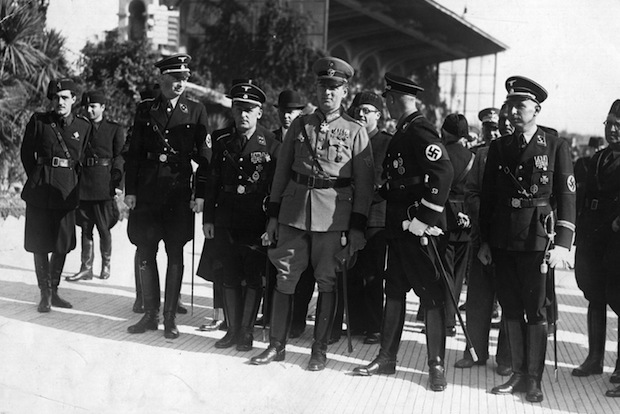At the time of the armistice of September 1943, when the kingdom of Italy formally transferred its allegiance from the Germans to the invading Allies, there were some 40,000 British prisoners-of-war languishing in camps around the country. Camp gates were thrown open by fleeing Italian guards, but on orders from Whitehall thousands of PoWs stayed put until the Germans arrived and packed them off to other camps in Germany. Some 4,000 of them, however, set off to seek freedom either by heading north towards Switzerland or south towards the advancing Anglo–American forces, which had just arrived on the Italian mainland after their conquest of Sicily.
Most of these escapees were ill-clad, hungry and in constant danger of betrayal by fascist sympathisers or capture by the occupying German forces that had swept down from the north to stem the Allied advance. The fact that so many survived was entirely due to the compassion and remarkable courage of thousands of Italian peasants who fed and sheltered them at huge risk to themselves.
The Germans had decreed that any Italian family offering succour to an escaped PoW would have its menfolk shot, its house burned down, and its women and children deported. Yet, to an extraordinary extent, Italian peasants — themselves suffering from great hardship and deprivation — disregarded this threat. Eric Newby, an escapee from the camp at Fontanellato near Parma, paid tribute to their heroism in his book Love and War in the Apennines. The late Mark Bonham Carter, publisher and Liberal politician, who as an officer in the Grenadier Guards had been captured by the Germans in Tunisia and taken to a camp near Assisi, escaped from there in 1943 and walked south for 400 miles, taking six weeks to reach the Allied lines. He described how he did it. He was lucky to have some sturdy shoes, and he gave himself two rules: never walk on a road and never stay anywhere for more than one night. Yet never during this long and hazardous trek was he ever refused help by those from whom he sought it.
His policy was always to knock on the door of the poorest-looking house in a village, anticipating that the people living there were unlikely to be fascists. He was never disappointed. It was, he said, normally the mother of the house who took the decision to help him. Italian mothers, having seen their own sons go off to war, felt sympathy for any young soldiers in danger, whatever their nationality, even if they were from a country that had only recently been fighting theirs in North Africa. If these British men had been trying to kill their own sons, this thought perhaps never occurred to them; or, if it did, never seemed to temper their compassion. Like so many British soldiers who were similarly cared for, Bonham Carter would never forget this kindness. He once told me that if he hadn’t been born British, he would have liked to be an Italian.
But it wasn’t until 1989, 44 years after the end of the war, that an effort was finally made to express their gratitude in a practical way. Keith Killby, a former British PoW who after the armistice escaped with 2,000 other prisoners from a camp at Servigliano near the village of Monte San Martino in the Marches region, founded a charity with which to reward the descendants of these brave and generous peasants.
The Monte San Martino Trust, as the charity is called, offers bursaries each year to 20 or so Italians aged 18 to 25, whereby they spend a month in England, lodging with English families in or around London and Oxford, where they attend language schools and get taught about ‘the British way of life’. Their feedback is immensely complimentary. Not all of them can claim descendancy from any particular family that sheltered a British PoW, but they all come from parts of the countryside in which the escapees found help. The Trust is currently engaged in a fund-raising effort for £1 million to ensure that its work can continue.
Donors include Rocco Forte and Olga Polizzi, the children of the late hotelier Charles Forte, who emigrated from Italy to Scotland at the age of four and used to say that he was never more infuriated than when some Englishman said that Italians were all cowards. Of course they are not. Though no great Italophile, Sir Max Hastings, in All Hell Let Loose, his recent book about the second world war, wrote this in his account of the Italian campaign: ‘Thousands of British soldiers were sheltered by tens of thousands of Italian country folk, whose courage and charity represented one of the noblest aspects of Italy’s unhappy part in the war.’ Quite so.
Got something to add? Join the discussion and comment below.
Get 10 issues for just $10
Subscribe to The Spectator Australia today for the next 10 magazine issues, plus full online access, for just $10.
You might disagree with half of it, but you’ll enjoy reading all of it. Try your first month for free, then just $2 a week for the remainder of your first year.














Comments
Don't miss out
Join the conversation with other Spectator Australia readers. Subscribe to leave a comment.
SUBSCRIBEAlready a subscriber? Log in